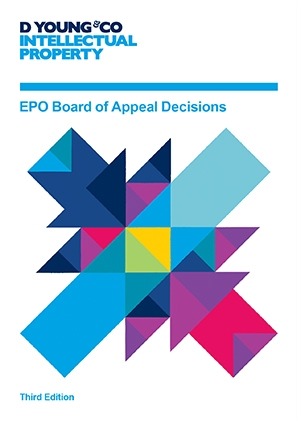Appeal fees: correcting incorrect appeal fee payments
At the European Patent Office (EPO) the appeal process is usually the last chance to have arguments considered. However, the appeal process can be complicated with a number of procedural steps that must be followed in order to avoid risking the appeal being considered to be inadmissible. In T 0444/20, the incorrect appeal fee was paid.
Background
The examining division issued a decision dated 15 October 2019 to refuse an application filed by LG Display Company, Ltd. The deadline for filing an appeal was consequently 02 January 2020 (taking holidays into account). The appellant’s representative filed a notice of appeal on 20 December 2019, which was therefore in time. However, the representative incorrectly paid EUR 1,880 for the appeal fee.
It is worth noting that earlier in 2019, the EPO had changed the appeal fee to a two-tier system. Whereas the appeal fee had previously been EUR 1,880 for everyone, the appeal fee was increased for “large entities” and the correct amount for this applicant had actually increased to EUR 2,255.
On 09 January 2020 (after the deadline for filing an appeal had passed), the representative was informed that the conditions for a reduced appeal fee were not met and that either a declaration that the applicant was entitled to the reduced fee must be filed, or the shortfall must be paid. The representative responded by paying the shortfall.
In its provisional opinion dated 14 April 2020, the Board of Appeal indicated that despite the shortfall having been paid, the appeal fee had not been paid in time and therefore the appeal was deemed not filed.
Overlooking small underpayments
In its provisional opinion, the Board of Appeal first considered whether the underpayment constituted a small amount under Article 8, RFees, which could therefore be ignored.
The Board of Appeal agreed with earlier case law (and notices in official journals) that Article 8 was to be interpreted to be referring to “insignificant” or “negligible” underpayments, for example, from unexpected bank transfer costs, currency exchange rates and so on and that this clearly excluded the much larger underpayment in question.
The Board of Appeal also noted that the underpayment amount was equal to the appeal fee discount being given to small entities. The Board of Appeal found it unlikely that such an amount could be considered to be small since the discount was presumably intended to be a genuine financial assistance to small entities.
The Board of Appeal also considered whether overlooking the underpayment was reasonable (another requirement of Article 8). Again, the Board of Appeal concluded that this was not the case. In particular, the Board of Appeal noted that the EPO had introduced a six-month grace period after the change to the appeal fee and overlooking the underpayment would undermine the point of this grace period.
Legitimate expectations
In J2/87, it was decided that an erroneous communication from the EPO, that caused the applicant to take an incorrect action, was null and void in its entirety. In the present case, the EPO had notified the representative that the shortfall in the appeal fee could be paid and the representative had reacted accordingly.
Here, the Board of Appeal ruled that J2/87 did not apply because J2/87 was referring to a situation in which a miscommunication caused the applicant to take incorrect action. In contrast, the representative in the present case had already taken the incorrect action themselves by filing the incorrect amount for the appeal fee. This situation was not affected by the EPO’s erroneous communication stating that the shortfall could be paid.
Correction under Rule 139 EPC
In response to the Board of Appeal’s provisional opinion, the representative filed a request for correction under Rule 139 EPC.
The correction was requested to be made to the representative’s notice of appeal dated 20 December 2019 to correct the amount that was to be paid (from EUR 1,880 to EUR 2,255). The representative argued that legal certainty was not breached, because the intention to pay the appeal fee was clear from the notice of appeal.
The representative also cited T 317/19, in which the board had ruled that Rule 139 EPC could be used to correct the payment of the appeal fee.
In an interlocutory decision of T 0444/20, the Board of Appeal ruled that the correction was acceptable.
Following the guidance of G1/12, the Board of Appeal agreed that:
- The fact that the new appeal fee for small entities was the same as the old appeal fee could give rise to confusion.
- No explicit declaration was given as to the eligibility of the entity for the reduced appeal fee, suggesting that the representative was not aware of the law change.
- The applicant was, quite obviously, not entitled to the reduction due to its large size.
The Board of Appeal also noted that other parties (such as those in T 317/19) had also been confused by the fee change, and also that the request for correction was quickly filed when the Board of Appeal had issued its preliminary opinion indicating that the appeal fee was incorrectly paid.
Conclusions
It is noteworthy that both T 0444/20 and T 317/19 concluded that in using Rule 139 to correct the instruction to debit a certain amount of money, this implicitly also corrects the actual underpayment itself (that is, the physical transfer of money).
Rule 139 is able to not only correct an error in a document, but can also correct acts that were correctly performed based on that error.
Of course, the full extent of this is not necessarily clear and it remains preferable to avoid the situation altogether!
As an auxiliary request, the representative had applied for re-establishment of the period for paying the appeal fee. However, this was not considered to be necessary since the application of Rule 139 EPC was accepted.
The appeal process remains procedurally complicated and a good knowledge of legal procedure and remedies can be extremely helpful in avoiding potential pitfalls.

